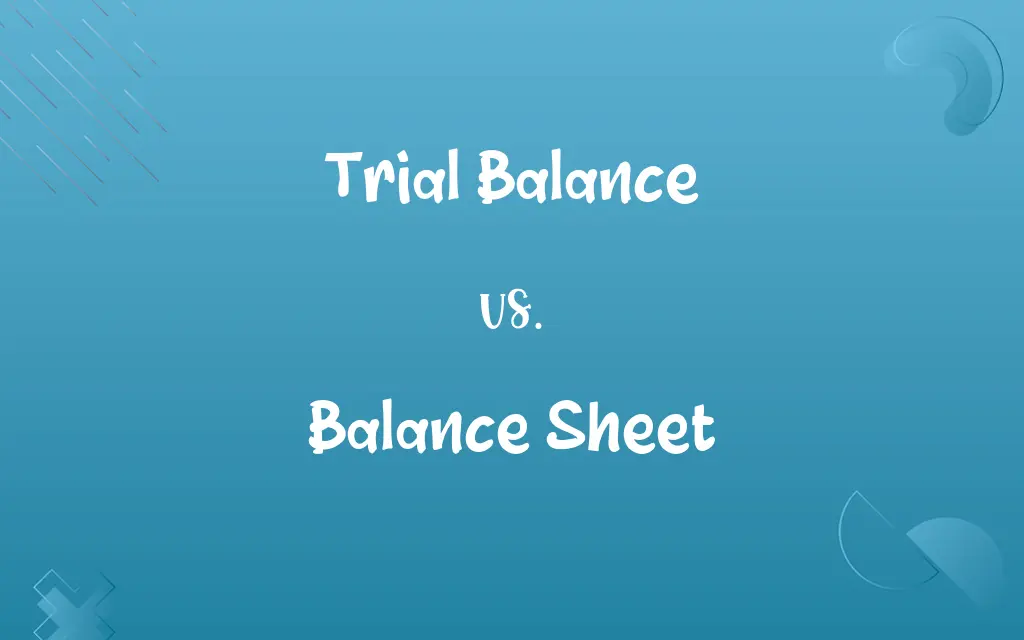Trial Balance vs. Balance Sheet: Know the Difference

By Shumaila Saeed || Published on December 29, 2023
A Trial Balance is a bookkeeping worksheet listing all ledger account balances, whereas a Balance Sheet is a financial statement showing a company's assets, liabilities, and equity.

Key Differences
The Trial Balance is an internal report listing the total debit and credit balances of all accounts in the ledger to check their accuracy, while the Balance Sheet is a financial statement that presents the financial position of a company at a specific point in time, showing assets, liabilities, and equity.
Shumaila Saeed
Dec 29, 2023
In a Trial Balance, the total debits must equal total credits, serving as a preliminary step in preparing financial statements; the Balance Sheet, however, is a finalized statement that categorizes assets, liabilities, and shareholder equity, reflecting the company's financial health.
Shumaila Saeed
Dec 29, 2023
The Trial Balance is used primarily by accountants to ensure the mathematical accuracy of the books, whereas the Balance Sheet is used by investors, creditors, and management to assess the company’s financial condition and make decisions.
Shumaila Saeed
Dec 29, 2023
While the Trial Balance is a tool for internal use to check the correctness of entries in the general ledger, the Balance Sheet is an external financial statement, mandatory for reporting purposes and scrutinized by external parties.
Shumaila Saeed
Dec 29, 2023
The Trial Balance is a simple listing without detailed classifications, mainly focusing on the arithmetic accuracy of the accounts, whereas the Balance Sheet is a more complex document, providing a detailed insight into the company’s financial status by classifying assets, liabilities, and equity.
Shumaila Saeed
Dec 29, 2023
ADVERTISEMENT
Comparison Chart
Purpose
To ensure debits equal credits for accuracy in bookkeeping.
To display financial position at a specific time.
Shumaila Saeed
Dec 29, 2023
Audience
Primarily for internal use by accountants.
For investors, creditors, and management.
Shumaila Saeed
Dec 29, 2023
Components
Lists all ledger accounts and their balances.
Categorizes assets, liabilities, and equity.
Shumaila Saeed
Dec 29, 2023
Timing
Prepared frequently during an accounting period.
Prepared at the end of an accounting period.
Shumaila Saeed
Dec 29, 2023
Detail Level
Generally a simple listing.
Provides detailed financial information.
Shumaila Saeed
Dec 29, 2023
ADVERTISEMENT
Trial Balance and Balance Sheet Definitions
Trial Balance
A Trial Balance is a report listing all ledger accounts with their respective debit or credit balances.
The accountant reviewed the Trial Balance to ensure all transactions were recorded correctly.
Shumaila Saeed
Dec 14, 2023
Balance Sheet
It represents the financial condition of a company at a given moment.
Investors studied the Balance Sheet to understand the company's net worth.
Shumaila Saeed
Dec 14, 2023
Trial Balance
It is a bookkeeping tool used to verify the equality of debits and credits.
After posting all entries, the Trial Balance was prepared to check for discrepancies.
Shumaila Saeed
Dec 14, 2023
Balance Sheet
A Balance Sheet categorizes a company's resources and obligations.
The Balance Sheet showed a healthy ratio of assets to liabilities.
Shumaila Saeed
Dec 14, 2023
Trial Balance
It is a worksheet summarizing the balance of each ledger account.
The Trial Balance showed an imbalance, indicating a possible error in ledger entries.
Shumaila Saeed
Dec 14, 2023
ADVERTISEMENT
Balance Sheet
A Balance Sheet provides a snapshot of what a company owns and owes.
The manager used the Balance Sheet to plan for future investments and expenses.
Shumaila Saeed
Dec 14, 2023
Trial Balance
A Trial Balance is used to detect errors in the double-entry bookkeeping system.
The company uses the Trial Balance to identify and correct accounting errors.
Shumaila Saeed
Dec 14, 2023
Balance Sheet
A Balance Sheet is a financial statement that shows a company's assets, liabilities, and equity at a specific date.
The Balance Sheet revealed the company's strong financial position with substantial assets.
Shumaila Saeed
Dec 14, 2023
Trial Balance
A Trial Balance serves as a preliminary step in the preparation of financial statements.
Before finalizing the financial statements, a Trial Balance was compiled to assess account balances.
Shumaila Saeed
Dec 14, 2023
Balance Sheet
It is a key financial statement used in assessing a company's liquidity and solvency.
Creditors reviewed the Balance Sheet to evaluate the company's ability to repay loans.
Shumaila Saeed
Dec 14, 2023
Repeatedly Asked Queries
What is a Trial Balance?
A Trial Balance is a bookkeeping worksheet summarizing the balances of all ledger accounts.
Shumaila Saeed
Dec 29, 2023
When is a Balance Sheet prepared?
At the end of an accounting period, such as a quarter or year.
Shumaila Saeed
Dec 29, 2023
What is a Balance Sheet?
A Balance Sheet is a financial statement showing a company's assets, liabilities, and equity at a certain date.
Shumaila Saeed
Dec 29, 2023
How often is a Trial Balance prepared?
It's typically prepared at the end of an accounting period, but can be more frequent for internal checks.
Shumaila Saeed
Dec 29, 2023
Who are the primary users of a Balance Sheet?
Investors, creditors, management, and external stakeholders.
Shumaila Saeed
Dec 29, 2023
Can a Trial Balance detect all types of accounting errors?
No, it only checks for mathematical accuracy, not errors like misclassifications or omissions.
Shumaila Saeed
Dec 29, 2023
What does a Balance Sheet indicate about a company?
It shows the company's financial health, including liquidity, solvency, and capital structure.
Shumaila Saeed
Dec 29, 2023
Who uses a Trial Balance?
Accountants and auditors for internal financial review and error detection.
Shumaila Saeed
Dec 29, 2023
Is a Trial Balance a mandatory financial statement?
No, it’s an internal document, not required for external reporting.
Shumaila Saeed
Dec 29, 2023
How are assets and liabilities arranged on a Balance Sheet?
Assets are typically listed first, followed by liabilities and shareholder equity.
Shumaila Saeed
Dec 29, 2023
Does a Trial Balance include detailed account information?
No, it simply lists account names with their total debits or credits.
Shumaila Saeed
Dec 29, 2023
What types of accounts are included in a Trial Balance?
All ledger accounts, including revenue, expense, asset, liability, and equity accounts.
Shumaila Saeed
Dec 29, 2023
How do current and non-current items appear on a Balance Sheet?
They are typically separated, with current items listed first.
Shumaila Saeed
Dec 29, 2023
Does a Balance Sheet show company performance over time?
No, it provides a snapshot at a specific point in time, not over a period.
Shumaila Saeed
Dec 29, 2023
Can the Balance Sheet help in investment decisions?
Yes, it provides crucial information for assessing a company’s financial viability.
Shumaila Saeed
Dec 29, 2023
Is a Balance Sheet mandatory for businesses?
Yes, especially for publicly traded companies, for financial reporting.
Shumaila Saeed
Dec 29, 2023
What happens if the Trial Balance doesn’t balance?
It indicates errors in the ledger entries that need to be investigated and corrected.
Shumaila Saeed
Dec 29, 2023
What if the debits exceed credits in a Trial Balance?
It suggests errors in the accounting entries that need rectification.
Shumaila Saeed
Dec 29, 2023
Is the Trial Balance part of formal financial statements?
No, it’s used internally and not included in formal financial reports.
Shumaila Saeed
Dec 29, 2023
How does the Balance Sheet help in debt management?
It helps in assessing the company's ability to manage and repay its debts.
Shumaila Saeed
Dec 29, 2023
Share this page
Link for your blog / website
HTML
Link to share via messenger
About Author
Written by
Shumaila SaeedShumaila Saeed, an expert content creator with 6 years of experience, specializes in distilling complex topics into easily digestible comparisons, shining a light on the nuances that both inform and educate readers with clarity and accuracy.









































































